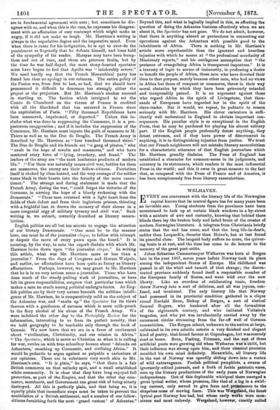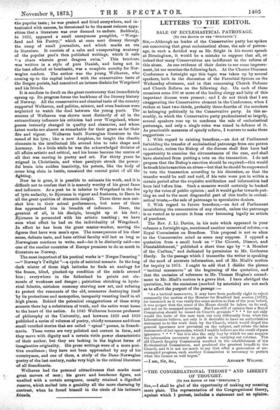WELHAVEN.
EVERY one conversant with the literary life of the Norwegian capital knows that its central figure has for many years been an invisible one. Young students from the provinces have been accustomed to look up at certain blank windows in a by-street with a mixture of awe and curiosity, knowing that behind those blinds there lay the broken body and faded brain of the creator of modern Norwegian literature. A telegram from Christiania briefly states that the end has come, and that the long life-in-death, sadder than Leopardi's, drearier than Heine's, has at last found its peaceful close. The languid body suffers no more, the quiver- ing brain is at rest, and the time has come to do honour to the memory of the great poet-critic.
Johan Sebastian Canamermeyer Welhaven was born at Bergen late in the year 1807, seven years before Norway took its place among the independent States of Europe. His childhood was passed in all the whirl and tumult of that change ; the discon- tented province suddenly found itself a responsible member of the European family of States, and went wild over the new liberty. Like an overdose of exhilarating tonic, freedom threw Norway into a sort of delirium, and all was joyous, con- fused, and irrational. The only literary life that Norway had possessed in its provincial condition gathered in a clique round Nordahl Brun, Bishop of Bergen, a sort of clerical Samuel Rogers, who hankered after all the formalities of the eighteenth century, and who imitated Voltaire's tragedies, and who yet was involuntarily carried away by the outermost circles streaming from the far-off well of German romanticism. The Bergen school, unknown to the nation at large, cultivated in its own eclectic coterie a very finished and elegant kind of poetry, that found favour at Copenhagen, but was scarcely read at home. Brun, Fasting, Frimann, and the rest of these artificial poets were growing old when Welhaven was a child, but their influence was strong upon him, and their classical precision moulded his own mind definitely. Meanwhile, all literary life in the rest of Norway was speedily sliding down into a vortex of wild extravagance. Foolish political pamphlets, a swarm of ignorantly-edited journals, and a froth of feeble patriotic verse, sum up the literary productions of the early years of Norwegian independence. Out of this deplorable whirlpool there emerged a great lyrical writer, whose presence, like that of a log in a swirl- ing current, only served to give form and prominence to the shapeless mass of moving foam. This was Wergeland, the fined lyrical poet Norway has had, but whose early works were mon- strous and moat unlovely. Wergeland, however, exactly suited the popular taste; he was praised and feted everywhere, and in- toxicated with success, he threatened to be the most ruinous appa- rition that a literature was ever doomed to endure. Suddenly, in 1832, appeared a small anonymous pamphlet, " Werge- land and his Poetry," which at once sent dismay through the camp of small journalists, and which marks an era -in literature. It consists of a calm and exasperating anatomy .of the popular poet's then published writings, which it calls "a chaos wherein great dragons swim." This brochure :was written in a style of pure Danish, and being not in he least affected or bombastic, was a complete novelty for Nor- wegian readers. The author was the young Welhaven, who coming up to the capital imbued with the conservative taste of -the Bergen purists, had conceived an intense disdain for Wergeland and his friends.
It is needless to dwell on the great controversy that immediately :sprang up. Its progress forms the backbone of the literary history -of Norway. All the conservative aud classical taste of the country supported Welhaven, and politics, science, and even business were neglected to watch the duel between the young poets. The .success of Welhaven was shown most distinctly of all in the -extraordinary influence his criticism had over Wergeland, whose poems instantly changed in quality and character, and whose latest works are almost as remarkable for their grace as for their -fire and vigour. Welhaven built Norwegian literature to the sound of his lyre ; like a new Amphion, he taught the chaotic -elements in the intellectual life around him to take shape and _harmony. In a little while he was the acknowledged dictator of all affairs artistic and critical, and his house became the centre of all that was moving in poetry and art. For thirty years he ,reigned in Christiania, and when paralysis struck the power- ful brain into sudden inactivity, his person, like the body of -some king slain in battle, remained the central point of all the fighting.
Now he is gone, it is possible to estimate his work, and it is difficult not to confess that it is scarcely worthy of his great fame and influence. As a poet he is inferior to Wergeland in the fire of lyric audacity, to Bjornson in vigour and freshness, to Ibsen in -all the great qualities of dramatic insight. These three men out- -shot him in their actual performance, but none of them has approached him in breadth of influence. Ibsen, the greatest of all, is his disciple, brought up at his feet ; Bjornson is permeated with his artistic teaching ; we have .seen what effect he had on the individuality of 1Vergeland. In effect be has been the great master-worker, moving the figures that have won men's eyes. The consequences of his clear -sense, delicate taste, and keen critical faculty will last as long as _Norwegians continue to write, and—let it be distinctly said—no one of the smaller countries of Europe promises to do so much in fiterature as Norway.
The most important of his poetical works is" Norges Dremring " —" Norway's Twilight "—a cycle of satirical sonnets. In the long -dark winter of those high latitudes he finds an analogy for the frozen, blind, pinched-up condition of the minds around lfim ; everywhere in the fatherland he points out ele- ments of weakness and danger ; patriotism shrieking in hyste- rical falsetto, mistaken economy starving new art, and refusing to protect the remnants of the old, commerce destroying itself by its protections and monopolies, incapacity vaunting itself in all high places. Behind the polemical exaggerations of these witty -sonnets there lay a substratum of truth, and the satire went home to the heart of the nation. In 1840 Welhaven became professor .of philosophy at the University, and between 1839 and 1859 published a series of volumes of poetry, chiefly romances and those -small versified stories that are called " apical " poems, in Scandi- mavia. These verses are very polished and correct in form, and they move with dignity and a certain virile power characteristic -of their author, but they are lacking in the highest forme of 'imaginative originality. His prose writings were of a more posi- tive excellence ; they have not been approached by any of his -countrymen, and one of them, a study of the Dano-Norwegian -poetry of the last century, ranks very high in the critical literature .of all Scandinavia.
Welhaven had the personal attractiveness that marks most great movers of men his grave and handsome figure, not nnallied with a certain arrogance, usually retained a dignified reserve, which melted into a geniality all the more charming by contrast, when he found himself in the circle of his intimate friends.



































 Previous page
Previous page